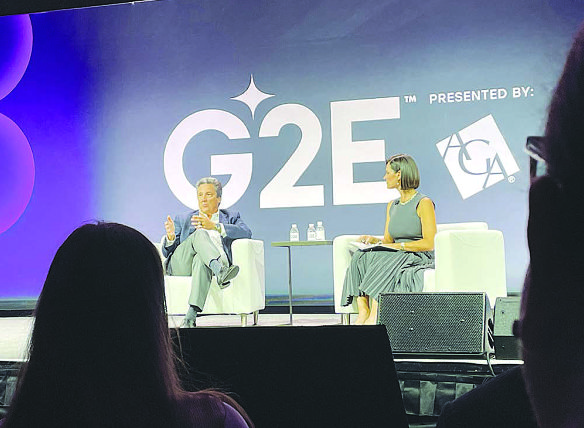
MGM Resorts International President Bill Hornbuckle, left, is interviewed by CNBC’s Contessa Brewer on Day 2 of 2024’s Global Gaming Expo at the Venetian Expo. Hornbuckle emphasized young people’s interest in expanded technolgy in gaming during a Q&A session.
Innovations in gaming space and expanding technology in the post pandemic era continue to attract a new, younger generation to Las Vegas and its casinos, MGM Resorts International President Bill Hornbuckle said Tuesday at the Global Gaming Expo.
At the MGM Resorts, “we’re going to do Family Feud, our first attempt at gamifying a game that will then be broadcast digitally,” Hornbuckle said.
“Today at Bellagio and at MGM, there are four simple roulette games being televised directly for live gaming.”
A decade ago, the gaming industry was still figuring out how to reach a younger generation, said Bill Miller, the American Gaming Association president.
The prevailing sentiment was that casinos would have to wait until millennials got older before the industry could tap the market, he added. In 2019, the average casino visitor was 50. It’s now 42.
“This is a huge shift for the industry, and it’s one that we need to keep driving to stay on the growth trajectory. Millennials are the largest generation living today.” Miller said. “This rising demographic is crucial to our industry’s future.”
The rise of sports betting, now legal in 38 states, also contributed to capturing gaming’s younger customers. Sports betting in the United States brought in $11 billion in revenue in 2023, the American Gaming Association reported.
Online, almost half of the players are men or women aged 18-34, according to a study from St. Bonaventure University.
Peter Jackson is CEO of Flutter Entertainment, which owns Fan Duel, a growing player in the market. Across FanDuel’s offerings, which includes fantasy sports and a sportsbook, the company has around 17 million customers. Flutter Entertainment reported $12 billion in revenue in 2023 but still posted a $1.2 billion netloss.
Nevada also has made a heavy investment in sports, approving public money to help build stadiums in Las Vegas for the NFL’s Raiders and baseball’s Athletics. The A’s are expected to begin playing herein 2028. “It echoes a broader integration of sports and gaming.
We see this in widespread partnerships between gaming companies and major sports leagues,” Miller said. “The result: Fan engagement is rising (and) broadcast rights and fees are growing.
After the forced isolation during the height of the pandemic, Miller said millennials were craving live experiences, reiterating the long-observed trend of younger people valuing how they spend their time more than what they buy.
“The question infamously about Las Vegas is (whether) it’s reached its peak. I’ve been hearing that literally from the 1980s,” Hornbuckle said. “And yes, some years are better than others, but it continues to grow.”
Now largely past the pandemic, Miller said the industry was continuing to target a younger audience through its mobile and online platforms.
Both gaming executives talked about their expansions internationally, including Flutter transferring its primary stock listing to the New York Stock Exchange, moving away from its London origins.
The company also recently bought a majority stake in a Brazilian company to tap into that country’s new-found distinction as one of the largest sports betting markets in the world after sports wagering was legalized therein 2018. “The American opportunity is immense. And yeah, that’s our primary focus as an organization,” Jackson said of Flutter.
“But outside of America, there’s a much bigger world … It’s a very, very fragmented market when we look at it globally.”
The Global Gaming Expo, known as G2E, is an industry trade show that annually bring upwards of 25,000 industry professionals and more than 350 exhibitors annually to Las Vegas. This year’s G2E, which began on Monday, continues through Thursday at the Venetian Expo.
kyle.chouinard @gmgvegas. com / 702-990-8923 / @Kyle_Chouinard

